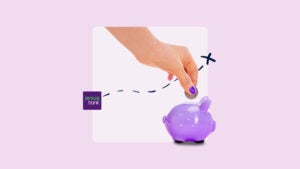How a lack of financial literacy could be costing you thousands

Key insights
- Nearly one-third (32%) of U.S. adults have less emergency savings than last year.
- While 74% of Americans believe owning a home is part of the “American Dream,” nearly a quarter (25%) of non-owners who aspire to home ownership say it’s because their credit isn’t good enough, while 17% blame it on having too much debt.
Financial literacy entails having a solid understanding of money management so you can make good decisions when creating a budget, saving and investing money, managing debt and paying taxes.
Being financially literate helps ensure you’ll have the skills needed to handle such tasks as budgeting, managing bills, investing money and saving for retirement and other financial goals.
Here we’ll go over ways lack of financial literacy could be costing you money, as well as ways you can save more money by becoming more knowledgeable about personal finances.
How lack of financial literacy can hurt consumers
Lack of knowledge when it comes to your bank accounts could mean you’re being charged fees that are avoidable, and you could also be losing out on opportunities to earn higher annual percentage yields (APYs).
Similarly, not paying attention to your credit card use or misunderstanding your credit card’s terms could cause you to wind up in debt that includes a hefty amount of interest. Whether it’s lack of knowledge about banking, credit cards or ways you might become a victim of financial fraud, financial illiteracy could leave you with unnecessary fees, a low credit score and difficulty borrowing money.
Knowledge is power, and without knowledge of fundamental financial concepts you rob yourself of power. You’ll pay more, you won’t get the best return on your money, and you won’t recognize opportunities that come along – good or bad. Financial illiteracy is harmful to your financial health in both the short term and long term.— Greg McBride, Bankrate Chief Financial Analyst
The effects of a lack of financial literacy can include:
- Not enough emergency savings, which could cause financial hardship in the event of a job loss, a big medical bill or a pricey car repair
- A credit card balance you can’t pay off each month, which incorporates interest charges
- A credit score that has decreased due to problems such as making late payments on credit cards or other bills
For some, problems such as credit card debt come with the silver lining of lessons learned. Washington resident Liz Stapleton had accumulated more than $10,000 in credit card debt by the time she graduated from law school and was working two part-time jobs. She went on to get a full-time job and paid off the debt by budgeting and no longer using credit cards.
These days, Stapleton has learned to track her expenses and cut out anything she finds she’s paying for yet not using. She shares her experiences on her personal finance blog called Less Debt, More Wine. She’s also set up automated transfers from checking to savings. “If you have to manually transfer money, you never save as much,” she says. She also has multiple savings accounts dedicated to different purposes, such as car insurance, a general emergency fund and a pet emergency fund.
Bank and credit card fees could be costing thousands
Here we’ll look at various ways a lack of personal finance knowledge could be costing you thousands each year, along with ways you could avoid unnecessary fees and put more money back in your bank account.
Bank fees
While bank fees are often easy to avoid, they’re commonly overlooked and can add up quickly. For instance, more than a quarter of Americans with a checking account are paying monthly fees, according to a Bankrate survey, which also found that these fees cost account holders an average of $24 a month — or $288 per year.
Monthly maintenance fees
Also known as service fees, monthly maintenance fees are sometimes charged on noninterest checking accounts and can often be waived if you maintain a set minimum balance.
What monthly maintenance fees may be costing you: Among noninterest checking accounts that charge such a service fee, the monthly average is $5.31 (or $63.72 per year), Bankrate’s latest checking account and ATM fee study found.
Ways to avoid monthly maintenance fees: If your bank charges monthly maintenance fees, you may be able to avoid them by maintaining a set minimum balance requirement. Otherwise, it’s not difficult to find a new bank account that doesn’t charge service fees.
ATM fees
The two types of fees you may face for using an out-of-network ATM are a surcharge from the bank that owns the ATM and a charge from your own bank for not using one of its ATMs.
What ATM fees may be costing you: Of these two types of ATM fees, the total combined average fee is $4.73, according to Bankrate’s checking account study.
Ways to avoid ATM fees: Make sure you only use ATMs that are in your bank’s network. If you find yourself needing ATM access frequently and there aren’t many in-network ATMs near you, consider switching to a bank that offers more ATMs. You can also obtain cash and avoid ATM fees by getting cash back at the register when making a purchase.
Overdraft fees
While some banks have reduced or eliminated overdraft fees, others still charge overdraft fees for covering the difference when you spend more money than what’s in your account.
What overdraft fees may be costing you: The average overdraft fee is $26.61, according to Bankrate’s 2023 checking and ATM fee study.
Ways to avoid overdraft fees: Some banks offer overdraft protection, in which case funds are automatically transferred from a linked account if you initiate a transaction that would otherwise overdraw the account. Other ways you can help avoid overdraft fees include setting up low-balance alerts or checking your balance frequently. You can also opt out of overdrafts, meaning any transaction that would overdraft your account will simply be denied by the bank.
Savings account yields
Since savings account APYs vary so widely, it’s important for anyone who wants the best rate to know what their account is earning. However, more than 1 in 10 consumers (14 percent) don’t know what, if any, interest their savings account is earning, Bankrate found. Big banks’ savings accounts often earn interest rates around 0.01 percent, whereas it’s not difficult to find rates elsewhere that earn rates of around 5 percent — 500 times greater than those of the big banks.
Ways to earn a higher yield: If you determine your savings account is earning a lackluster yield, shop around for a bank where you can earn a competitive APY instead. High-yield savings accounts are often found at online banks, which don’t have the overhead expenses of maintaining branches and can pass on the savings.
Credit card interest and fees
When you’re in credit card debt, it’s easy to feel overwhelmed and avoid paying attention to the interest charges on your monthly statement. However, it can be shocking how much that interest adds up over time.
What credit card interest and late fees could be costing you: The average variable credit card annual percentage rate (APR) is currently 20.8 percent — and this rate can be higher for individuals who have low credit scores. For someone carrying a balance of $5,000 and a 20 percent APR, this can translate to around $82 in interest added to your balance in a month — or $984 in a year.
What’s more, if you don’t make your credit card payment on time, you’ll likely be hit with a late fee. The typical credit card late fee is $32, according to the Consumer Financial Protection Bureau (CFPB). (The bureau recently capped these fees at $8, yet the rule has yet to take effect and is being challenged legally.)
Ways to avoid credit card interest charges and late fees: A surefire way to avoid being charged credit card interest is by paying off your balance in full each month. If you determine it’ll take you several months to pay off a balance, you may want to consider transferring your balance to a lower-rate card.
You can help avoid late fees on your credit card payments by setting up automatic payments or calendar reminders soon before a payment is due. If you have many bills due at once, consider asking your credit card issuer to change your payment date.
Fraud and identity theft
There are many types of scams in which hackers try to empty your bank account. These include identity theft, phishing, check fraud and peer-to-peer payment scams. Not having knowledge about such crimes can make you more susceptible to becoming a victim of them.
What fraud cost consumers in 2023: Consumers collectively lost $10 billion to fraud last year, according to the Federal Trade Commission. This figure is up from $8.8 billion in 2022.
Ways to avoid being a victim of fraud and identity theft: Read up on common types of bank account fraud to help ensure you don’t fall victim to it. For each of your financial accounts, use multi-factor authentication and have a unique password that would be difficult for others to guess.
Be cautious of emails that appear to be from your financial institution, especially those that ask for your personal information. If you want to verify whether such an email is legitimate, call your bank at a number you know is valid, the Federal Deposit Insurance Corp. (FDIC) advises.
Monitor your bank accounts regularly for any suspicious-looking activity. Likewise, check your credit report regularly for anything unfamiliar, and contact the credit bureau if you suspect fraud. If you suspect bank account fraud, contact your bank and other authorities right away.
Ways to gain financial literacy
If you’re looking for ways to increase your financial literacy, there are plenty of helpful online resources that are free, including tips and advice on saving money, staying out of debt and following a budget.
Boost your financial IQ
Social media influencers, podcasts, blogs and books can offer news and advice on money management. Whether you’re looking for practical tips or inspiration, some resources that can foster financial literacy include:
- Social media accounts: Yahoo Finance YouTube channel, The Broke Black Girl Instagram account
- Podcasts: Your Money Briefing from Wall Street Journal, Planet Money from National Public Radio
- Blogs: Making Sense of Cents, Clever Girl Finance
- Books: The Psychology of Money by Morgan Housel
Create a budget
Following a monthly budget is the key to successful money management. Through a budget, you’ll keep track of the money that comes in and goes out each month. This ensures you’ll have enough for essential and non-essential expenses, as well as money to add to savings each month.
Different types of budgeting methods include:
- Envelope budgeting
- Also known as cash stuffing, this system involves placing cash into designated envelopes based on how much you’ll need for different purposes each month. You’ll label the envelopes for categories such as housing, transportation, groceries, utilities, debt repayment and dining out. Only allowing yourself to spend what’s in each envelope can help ensure you won’t overspend.
- 50/30/20 budget
- A 50/30/20 budget consists of devoting 50 percent of your income to things you need, 30 percent to things you want and 20 percent to savings. A benefit of this budget strategy is it can eliminate the need to create a detailed spending plan, thanks to its three simple categories.
- Zero-based budget
- A zero-based budget assigns a purpose to every dollar you bring in each month, whether it’s rent, recreation or savings. The goal is to effectively stay on track with your money management and avoid impulse spending.
Ultimately, having a budget can help you with financial goals such as saving for emergencies, paying down debt, investing money, and setting aside money for retirement. Conversely, not keeping proper track of your money can end up costing thousands over time due to things like late fees or credit card interest.
Bottom line
Understanding the workings of your bank accounts and credit card accounts can help you avoid fees and penalties, and it can also help you earn higher interest on your savings. Similarly, understanding financial crimes and identity theft can help you keep your bank accounts safe and secure.
If you feel you could benefit from being more financially literate, free resources available to you include MyMoney.gov, a national financial education website created through the U.S. Financial Literacy and Education Commission. And the CFPB offers tools and resources on topics like auto loans, credit cards, bank accounts and money management.
If you’re a parent, consider helping your child become more financially literate. Nearly half (41 percent) of teens say they haven’t had any financial literacy classes at school. Nonprofit organization Next Gen Personal Finance offers free online games for kids that help teach them about careers, investing, budgeting and paying for college.
Why we ask for feedback Your feedback helps us improve our content and services. It takes less than a minute to complete.
Your responses are anonymous and will only be used for improving our website.






